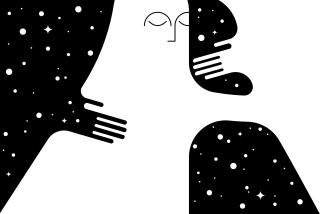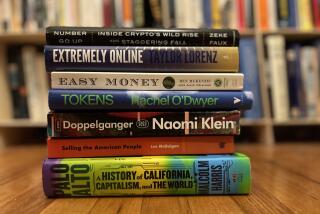What Is Cyberspace? The Answer Is Part Science and Part Philosophy
- Share via
Now that the 21st century is officially underway, we can all lock arms and march off into cyberspace. But first, one small question: Where are we going?
No one had even heard of cyberspace until William Gibson coined the term in his 1984 cyberpunk novel “Neuromancer.” Now just about everyone in the industrialized world seems to know about it. But even scholars who have spent years studying it can’t agree on what it really is.
Is it just a maze of circuits and wires and computers that represent little more than an advanced communication system?
Or is it, as psychologist Sherry Turkle of MIT has suggested, a place where we can assume new identities and live out our lives as “other selves” that are just as real as the imperfect bodies we inhabit on this planet?
Or maybe, as Los Angeles philosopher and writer Margaret Wertheim argues, it’s “a ‘place’ outside physical space.’ ” In her scholarly book “The Pearly Gates of Cyberspace,” Wertheim compares cyberspace with age-old concepts that “man is a bipolar being consisting of a mortal material body and an immaterial ‘essence’ that is potentially immortal.
“This posited immortal self, this thing that can supposedly live on in the digital domain after our bodies die, this I dub the ‘cybersoul.’ ”
These disembodied souls we have launched into cyberspace interact with other souls to create “a network of relationships,” which is the real core of cyberspace, she adds.
Wow. Sounds a bit like heaven. But, as Wertheim notes, it could also be hell.
The phenomenal growth of the Internet suggests that this is not just another technological leap. Normally, new technologies catch on slowly. The Chinese, for example, invented the steam engine 1,000 years before anyone put it to work.
The Internet had a humble beginning when the Department of Defense linked computers at two sites, UCLA and the Stanford Research Institute, in a precursor called Arpanet. It took a decade for the number of sites to reach 61.
But today, the number of sites and users is growing so fast that if it continues at its current pace, “the total number of Internet users would exceed the population of the world in the early years of the 21st century,” according to a projection from Nicholas Negroponte, director of MIT’s Media Lab.
No wonder scholars are putting a mythological face on cyberspace.
To understand why, according to MIT’s Turkle, you first have to understand the allure of the computer. Turkle has studied hundreds of computer users, concentrating on the true devotees who called themselves “hackers” before that word took on an ugly meaning. Borrowing from a guru of another age, the computer is the message.
“They described what they did with their computers with phrases such as ‘building another room in my mind,’ ” Turkle writes in her book “The Second Self, Computers and the Human Spirit.” “Once people actually had a computer in their home, the most interesting thing about it became the computer itself, not for what it might do, but for how it made them feel.”
She compared those obsessed with computers to “the virtuoso pianist or the sculptor possessed by his or her materials. Hackers too are ‘inhabited’ by their medium. They give themselves over to it and see it as the most complex, the most plastic, the most elusive and challenging of all. To win over computation is to win. Period.”
She finds that particularly enlightening because so many computer freaks see themselves as just that--freaks who are uncomfortable in a world that places so much value on physical appearance.
Thus they migrate to cyberspace, creating new selves that are not subject to the same limitations.
The self-determining character of cyberspace is a key part of its attraction, according to digital guru Esther Dyson.
“The Net offers us a chance to take charge of our own lives and to redefine our role as citizens of local communities and of global society,” Dyson writes in her book “A Design for Living in the Digital Age.”
It is precisely that freedom that attracts so many to the Internet. Anonymity also plays a role for those who want to act out fantasies without anyone knowing who they are.
But as Wertheim and others warn, the lack of a hierarchal structure within the Internet may already be disappearing. More e-mail addresses, for example, identify the sender’s affiliation with a prestigious organization, thus creating status in an arena that has prided itself on having equal status for all.
In the next few years, some Internet sites will so dominate their fields that others will find it tough to compete. Some already do. It’s going to be a lot harder for the next digital entrepreneur to become Time’s person of the year.
That almost certainly will lead to a power structure within the Internet that will set new rules. That’s the way it has happened everywhere else throughout human history, and there’s no reason to think the Internet will be any different. It’s just a little harder to figure out how to do it.
Someday, somebody will.
But for now, we can go on re-creating ourselves as cybersouls, leaving out the bad parts and enriching the good.
“One of the appeals of cyberspace is precisely the relief it provides from the relentless bodily scrutiny that has become a hallmark of life in contemporary America,” writes Wertheim. “In the bit stream, no one can see you wobble. Here, fat, wrinkles, gray hair, acne, baldness, shortness and other aesthetic ‘sins’ of the flesh are also hidden from view--all supposedly left behind in the messy material world.”
OK. But one of the presents under my Christmas tree this year was a digital camera that sits on top of my computer. If I ever hook it up, my cybersoul will have the same gray beard and fat cheeks that I see in the mirror every day.
*
Lee Dye can be reached at leedye@ptialaska.net.






